Useful list from TechCrunch.
Missing column
As a result of some — as yet unexplained glitch — yesterday’s Observer column didn’t make the leap from print to Web. If you’re interested here’s a pdf.
Who said there isn’t life after death? Hard on the heels of Radiohead’s ‘pay what you like’ experiment — in which fans were able to decide how much (or how little) they wanted to pay for the group’s latest album — comes news that Cliff Richard is also testing new online business models. He’s asking his fans to determine the price of his forthcoming meisterwerk, ‘Love, the Album’. The maximum anyone will be charged is £7.99 (the price of an album on the iTunes store) but the the final price will be determined by how popular the album is — as measured by the volume of advance orders.
Ingenious, eh? It just shows that there’s still life in these old codgers. Sir Cliff says he had no choice but to embrace new technology. ‘Who’d have thought I’d get a buzz from creative marketing?’ he told the Daily Telegraph. ‘As artists we face a stark choice. We either keep one step ahead of the technology which is changing our industry so radically – or we throw up our hands and quit. Personally I’m not for quitting.’
Right on…
Correction: The column was published on the Web edition, but in a different location. Phew!
BuzzMachine in Cambridge
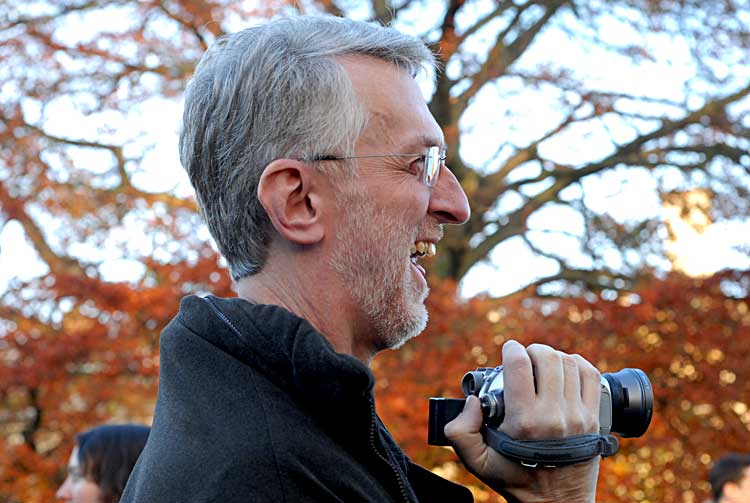
Jeff Jarvis came to Cambridge yesterday and had lunch with a group of us in the Eagle. I’ve been reading his blog for years, and greatly admire his sharpness and clarity. As he talked over lunch, I was reminded of something Noel Annan said once about a colleague. “I wish I was as sure of anything as that man is about everything”. Afterwards we went on a stroll down Free School Lane past the Old Cavendish laboratory where the electron was discovered (by J.J. Thompson) and the atom was split for the first time (by John Cockroft and Ernest Walton) and the structure of the DNA molecule was elucidated (by James Watson and Francis Crick). We paused by the plaque commemorating the discovery of the electron and Jeff pulled out his camera.
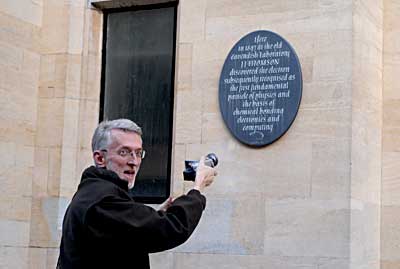
So of course I photographed him doing so. What I didn’t realise is that Quentin was at that moment trying to get into position to photograph me photographing Jeff. But the main subject moved and so what David Good described as a perfect postmodernist photographic moment passed unrecorded.
Thanks to Bill Thompson for arranging a great lunch.
John Seely Brown
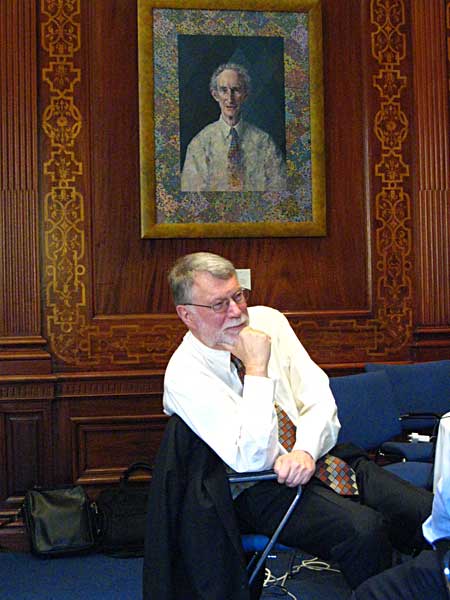
John Seely Brown, photographed at the Royal Society last Monday. The portrait behind him is of Robert May.
Homeward bound
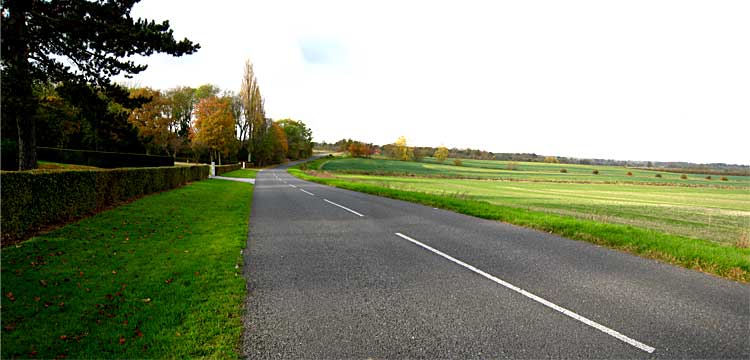
I cycled home from town yesterday. Along this lovely road.
Gateway
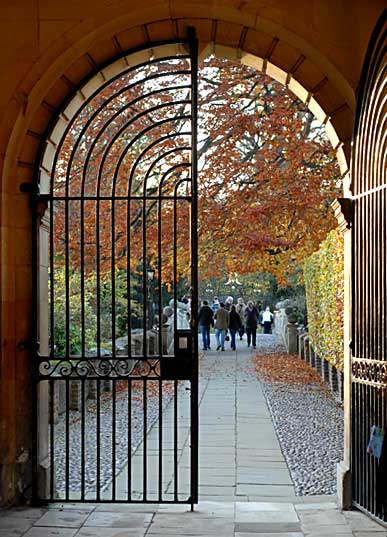
The gate in Clare College which leads to the Backs. Photographed this afternoon.
Autumn in King’s

King’s College Chapel this afternoon. Ruskin called it “a great upturned sow”. Silly man. It’s a wonderful building.
Another facebook valuation
From Jeff Jarvis…
A Deutsche Bank analyst says that a newspaper reader in 2004 was worth $964 a year. Today, that’s $500. Facebook’s 50 million active users translates to $300 per at that valuation. And newspapers are shrinking while Facebook is growing by 200,000 new users a day. A day. And those users spend an average of 20 minutes each day inside the site vs. 41 minutes a month on newspaper sites, says DB…
CameronAir, the new luxury airline
Well, well. Dave “Vote Blue to get Green” Cameron and his chaps travel in style: they go in ‘Lord’ Ashcroft’s Falcon jet ($30 million secondhand).

Altogether shadow cabinet ministers and aides have flown 184,000 miles on the Ashcroft jet over the last five years with Andrew Mitchell, the shadow international development secretary, flying 65,453 miles and shadow foreign secretary William Hague flying 49,670 miles.
Analysis conducted for the Guardian reveals that Tory globetrotting has racked up 1,289 tonnes of carbon emissions. The biggest footprint was made by Michael Ancram when he was shadow foreign secretary and shadow defence secretary, according to environmental consultants Carbon Footprint. Mr Ancram’s flights emitted 372 tonnes, including trips to Cuba, Afghanistan, Egypt and Poland. The plane’s movements are being tracked by planespotters who logged it leaving Luton empty to fly to Khartoum to pick up Mr Cameron and return him to Britain. Indeed spotting the Ashcroft jet seems to have become a bit of cult on spotter blogs.
It would be churlish to complain about all this privileged transport, given Dave’s understandable pride in his privileged background. But there is still the small matter of Parliamentary declarations.
Mr Hague declares a trip on Lord Ashcroft’s jet to Belize, Brazil, the Falklands, Iceland and Panama as being worth £8,486, the equivalent of flying first-class. Yet to hire a Falcon with Premier Aviation would cost £55,000 for a one-way trip to New York alone.
Labour MP Tom Watson said: “There appears to be a huge discrepancy between, say, David Cameron’s declaration of £16,000 for the cost of his trip to Darfur and the cost of hiring a similar jet from a commercial firm. I got a quote of over £100,000 to hire a jet to go to Khartoum.”
If you’re interested in travelling Cameron-style, get the latest fares here.
So who didn’t ‘get’ it?
Lovely column by Geoffrey Wheatcroft which includes this gem:
As to the idea, flourished after the event by the dreaded liberal hawks as well as neoconservatives, that an invasion would bring democracy to Iraq, it’s tempting to say that comment is superfluous. In fact there is still something to be said – and it was said by Jacques Chirac at a meeting with Tony Blair that has been described by Sir Stephen Wall.
While reiterating his opposition to the war that was about to begin, Chirac made a number of specific points. He reminded Blair that he and his friend Bush knew nothing of the reality of war but that he did: 50 years ago, the young Chirac served as a conscript in the awful French war in Algeria, which Iraq resembles in all too many ways. Then he said that the Anglo-Saxons seemed to think that they would be welcomed with open arms, but they shouldn’t count on it. In a very percipient point, Chirac added that a Shia majority shouldn’t be confused with what we understand as democracy.
He ended by asking whether Blair realised that, by invading Iraq, he might yet precipitate a civil war there. As the British left, Blair turned to his colleagues and said, doubtless with that boyish grin we happily see less of nowadays, “Poor old Jacques, he just doesn’t get it.” Well, who got it?
